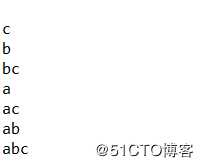标签:运行 info 元素 递归函数 原则 valueof stat length 字符串
汉诺塔:从左到右有A、B、C三根柱子,其中A柱子上面有从小叠到大的n个圆盘,现要求将A柱子上的圆盘移到C柱子上去,期间只有一个原则:一次只能移到一个盘子且大盘子不能在小盘子上面,求移动的步骤.
思路:当只有一个盘子时,直接将盘子从左移到右;当有n个盘子时,将n-1个盘子借助右柱从左柱移到中柱,然后将第n个盘子从左柱移到右柱,最后将n-1个盘子借助左柱从中柱移到右柱.
public class Hannuota {
public static void f(int n, String from, String to, String help) {
if(n == 1) {
System.out.println("move " + 1 + " from " + from + " to " + to );
}else {
f(n - 1, from, help, to);
System.out.println("move " + n + " from " + from + " to " + to );
f(n - 1, help, to, from);
}
}
public static void main(String[] args) {
f(3, "左", "右", "中");
}
}运行结果:
求子集思路:在递归函数里,对于字符串中的每一个元素,有选择该元素与不选择该元素两种情况.
public class SubSet {
public static void subSet(char[] s, int i, String res) {
if( i == s.length) {
System.out.println(res);
return;
}
subSet(s, i + 1, res); //不要该元素
subSet(s, i + 1, res + String.valueOf(s[i])); //要该元素
}
public static void main(String[] args) {
String test = "abc";
subSet(test.toCharArray(), 0, "");
}
}运行结果;
标签:运行 info 元素 递归函数 原则 valueof stat length 字符串
原文地址:https://blog.51cto.com/14472348/2481190